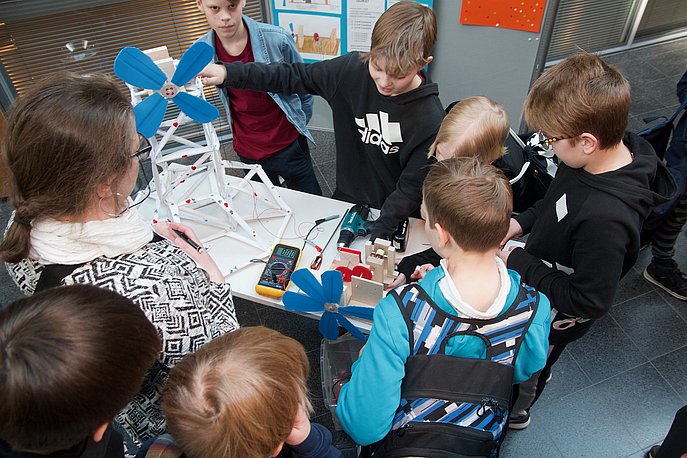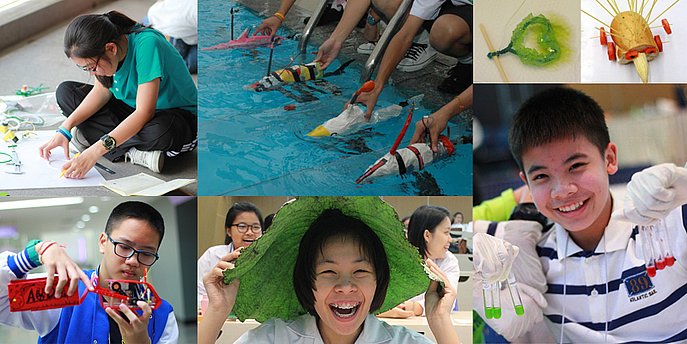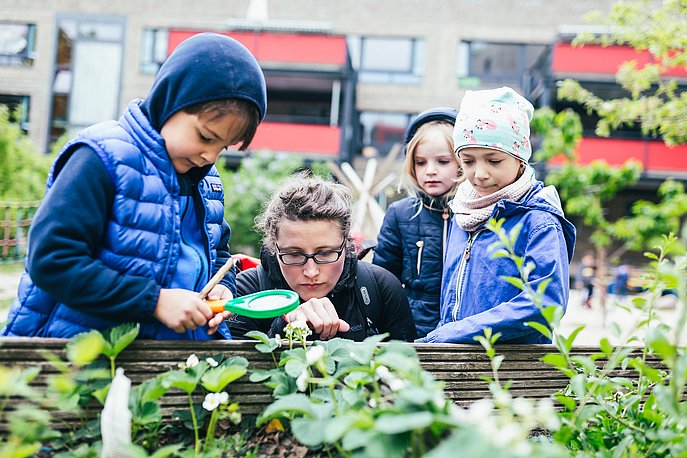Distinguished STEM Initiatives Showcasing at #IDoS2019
Education initiatives throughout the world use STEM education to empower children to become independent-thinking adults who can contribute to overcoming global challenges. For the last International Dialogue on STEM Education conference (IDoS 2019), we have brought together some of those curious minds from all over the world who were helping to identify the potential of early STEM education for a more sustainable future.
-

© Markus Jylhä / LUMA Centre Finland
-

© NSTDA
-

© Christoph Wehrer / Stiftung Kinder forschen
To find outstanding STEM initiatives for the second edition of IDoS, a worldwide call for projects was issued. From an overwhelming number of submissions received, our programme committee selected seven initiatives from six continents. These were given the opportunity to lead a workshop at IDoS 2019, presenting global similarities and differences regarding “STEM Education for Sustainable Development”.
Initiatives showcasing at the IDoS 2019 conference
-
Centre for Mathematics, Science and Technology Education in Africa
The Centre for Mathematics, Science and Technology Education in Africa (CEMASTEA) is a Kenyan public institution established in 2004 with the mandate to provide Teacher Professional Development in Mathematics and Science Education (TPD-MSE), a role that has enabled it to realize milestones in human resource capacity for quality mathematics and science education programmes across the African continent. CEMASTEA has received continental recognition to coordinate and host continental secretariats such as the African Union Commission Continental Education Strategy for Africa (AUC-CESA, 2016–25) cluster on STEM education; the Association for the Development of Education in Africa’s Inter-Country Quality Node on Mathematics and Science Education (ADEA: ICQN-MSE); and the Strengthening of Mathematics and Science Education in Africa (SMASE Africa), a network of 27 countries. These platforms enable policy dialogue to begin at the practitioners’ forum, the SMASE Africa network, and move to the ministerial forum at ICQN-MSE and finally to the level of the heads of state, who draw from the CESA cluster on STEM.
-
Smithsonian Science Education Center
The Smithsonian Science Education Center, attempting to empower the next generation of decision makers capable of making the right choices about the complex socio-scientific issues facing human society, blends together previous practices in Inquiry-Based Science Education (IBSE), Social Studies Education (SSE), Global Citizenship Education (GCE), and Education for Sustainable Development (ESD). In collaboration with the InterAcademy Partnership (IAP) and the private sector, the Smithsonian Science Education Center has made a collaborative commitment to developing a set of free community research guides for students from ages 8 - 17. Entitled Smithsonian Science for Global Goals, these community research guides aim to teach students the science behind the United Nations Sustainable Development Goals and to encourage them to take action to use this science to do social good in their communities.
-
Sirindhorn Science Home
In Thailand, Sirindhorn Science Home is the national learning centre for STEM activities for teachers and children under the STEM academy program. The STEM academy programme aims to equip young people with three major skills for a worthwhile future: inspiration, motivation, and creativity. The key pillars of the work that Sirindhorn Science Home is doing are STEM teachers training, a STEM camp for students, and the development of curricula and science material books. Building on this, the STEM academy can encourage and help develop essential skills, such as critical thinking, communication, collaboration, and creativity. Above all, it is one of the main organizations that contribute to STEM education for sustainable development. Sirindhorn Science Home was established under the National Science and Technology Development Agency (NSTDA), Ministry of Higher Education Science Research and Innovation.
-
StarT
In StarT, students carry out projects related to science, technology, or mathematics, and teachers get support for the implementation of interdisciplinary and collaborative project-based learning. In order to spread innovations made in classrooms around the world, StarT shares and gives awards to the most distinguished student projects and teachers' best educational practices annually. StarT’s main goal is to work towards a better future by promoting children’s STEM and 21st century skills through the international StarT programme. As such, the StarT projects empower children to use STEM to solve issues related to sustainability, showing them that they can actively contribute to a better future. Furthermore, StarT offers, for example, massive open online courses (MOOCs), a material bank, a virtual club, and StarT ambassadors. Associated StarT is organized by the LUMA Centre Finland.
Stiftung Kinder forschen
The non-profit Stiftung Kinder forschen (Little Scientists Foundation) is committed to good early education in the domains of science, technology, computer science, and mathematics with the aim of strengthening children for the future and enabling them to act in a sustainable way. Together with its local network partners, the Foundation provides a nationwide professional development programme that supports pedagogical staff at early childhood education and care centres, after-school centres, and primary schools in facilitating the exploration, inquiry, and learning of children between the ages of three and ten. The mission of the Stiftung Kinder forschen is to promote a questioning and inquiring attitude in children; to give children the opportunity to discover at a young age their own talents and potential in the domains of science, technology, computer science, and mathematics; and, by so doing, to lay the foundations for reflective engagement with technological and social changes in the interests of sustainable development.
-
Pontificia Universidad Catolica de Chile, Campus Villarrica
At its Villarrica Campus, Pontificia Universidad Católica de Chile offers certification to pre- and in-service teachers by providing courses covering the topics inquiry-based learning, the science of sounds, pedagogical approaches for the 21st century, and project-based learning. All of these courses consist of lectures and practical work at schools. The educational activities are planned by the schools in collaboration with the university, taking into account their necessities and capacities. Last year, the Villarrica Campus complemented the above-mentioned certifications with a diploma focusing on Education for Sustainable Development. The diploma seeks to enable teachers to give the children opportunities to shape local change and, by giving them more contextualized experiences, to transform their own realities towards a more sustainable world.
-
Primary Connections
Primary Connections – Linking science with literacy is an innovative programme developed by the Australian Academy of Science linking the teaching of science with the teaching of literacy in primary schools. An evidence-based approach, Primary Connections provides exemplary curriculum resources and a comprehensive and practical professional learning programme, with a focus on developing students’ knowledge, understanding, and skills in both science and literacy. Primary Connections incorporates rich professional learning workshops for teachers accompanied by exemplary curriculum resources. Hence, it supports teachers in facilitating an inquiry teaching and learning approach that combines hands-on investigations, evidence-based reasoning, and collaborative group work to build skills necessary for students to thrive in the 21st century.
International Dialogue on STEM Education
The "International Dialogue on STEM Education" (IDoS) was a joint conference of the Stiftung Kinder forschen (then "Haus der kleinen Forscher" Foundation) and Siemens Stiftung that took place in 2017 and 2019 under the auspices of the German Commission for UNESCO. Further partners and sponsors were the German Federal Foreign Office, the Robert Bosch Stiftung, and the OECD.